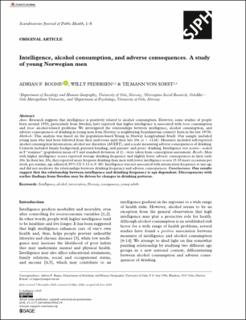| dc.contributor.author | Rogne, Adrian Farner | |
| dc.contributor.author | Pedersen, Willy | |
| dc.contributor.author | Von Soest, Tilmann | |
| dc.date.accessioned | 2021-05-20T11:05:33Z | |
| dc.date.available | 2021-05-20T11:05:33Z | |
| dc.date.created | 2020-09-17T16:19:47Z | |
| dc.date.issued | 2020 | |
| dc.identifier.issn | 1403-4948 | |
| dc.identifier.uri | https://hdl.handle.net/11250/2755850 | |
| dc.description.abstract | Research suggests that intelligence is positively related to alcohol consumption. However, some studies of people born around 1950, particularly from Sweden, have reported that higher intelligence is associated with lower consumption and fewer alcohol-related problems. We investigated the relationships between intelligence, alcohol consumption, and adverse consequences of drinking in young men from Norway (a neighboring Scandinavian country) born in the late 1970s.
Methods:
This analysis was based on the population-based Young in Norway Longitudinal Study. Our sample included young men who had been followed from their mid-teens until their late 20s (n = 1126). Measures included self-reported alcohol consumption/intoxication, alcohol use disorders (AUDIT), and a scale measuring adverse consequences of drinking. Controls included family background, parental bonding, and parents’ and peers’ drinking. Intelligence test scores—scaled in 9 “stanines” (population mean of 5 and standard deviation of 2)—were taken from conscription assessment.
Results:
Men with higher intelligence scores reported average drinking frequency and slightly fewer adverse consequences in their early 20s. In their late 20s, they reported more frequent drinking than men with lower intelligence scores (0.30 more occasions per week, per stanine, age adjusted; 95% CI: 0.12 to 0. 49). Intelligence was not associated with intoxication frequency at any age and did not moderate the relationships between drinking frequency and adverse consequences.
Conclusions:
Our results suggest that the relationship between intelligence and drinking frequency is age dependent. Discrepancies with earlier findings from Sweden may be driven by changes in drinking patterns. | en_US |
| dc.language.iso | eng | en_US |
| dc.publisher | SAGE Publications | en_US |
| dc.rights | Navngivelse 4.0 Internasjonal | * |
| dc.rights.uri | http://creativecommons.org/licenses/by/4.0/deed.no | * |
| dc.title | Intelligence, alcohol consumption, and adverse consequences: A study of young Norwegian men | en_US |
| dc.type | Peer reviewed | en_US |
| dc.type | Journal article | en_US |
| dc.description.version | publishedVersion | en_US |
| cristin.ispublished | true | |
| cristin.fulltext | original | |
| cristin.qualitycode | 1 | |
| dc.identifier.doi | 10.1177/1403494820944719 | |
| dc.identifier.cristin | 1830947 | |
| dc.source.journal | Scandinavian Journal of Public Health | en_US |
| dc.relation.project | Norges forskningsråd: 288083 | en_US |
| dc.relation.project | Norges forskningsråd: 240129 | en_US |

